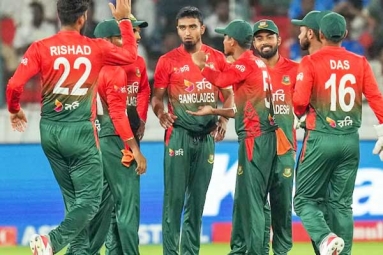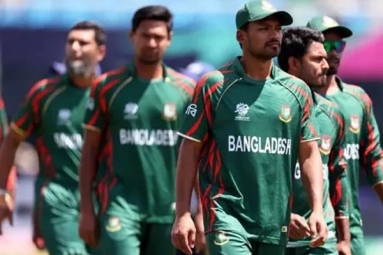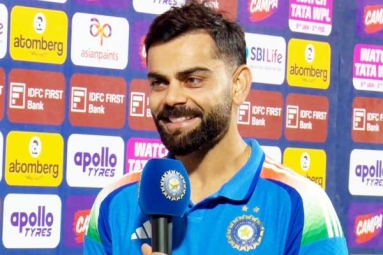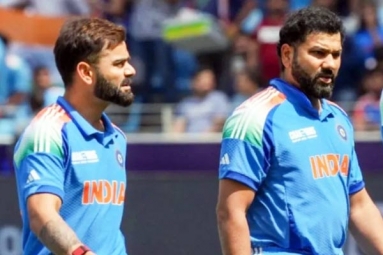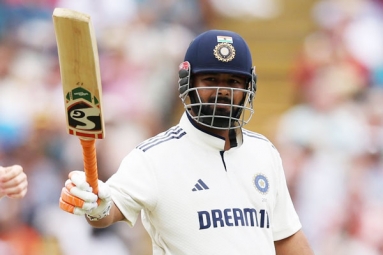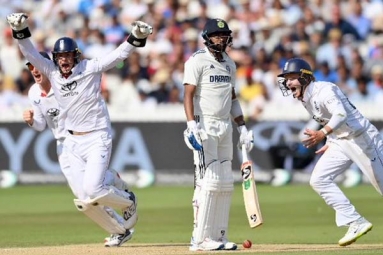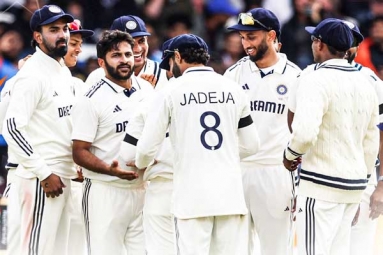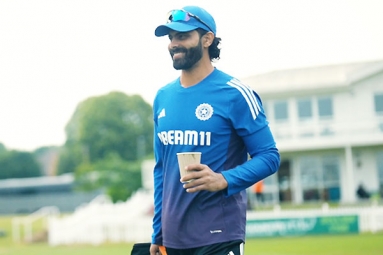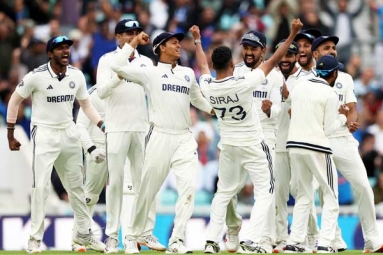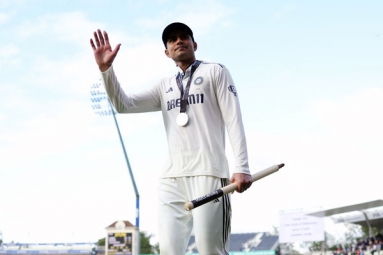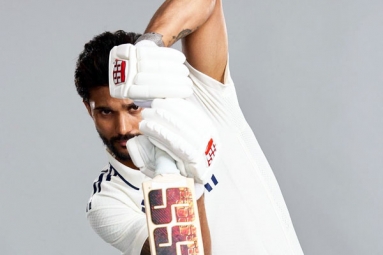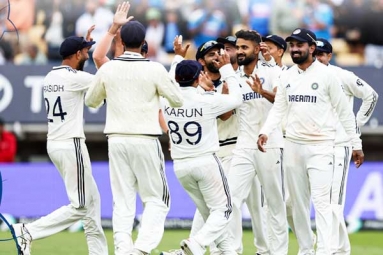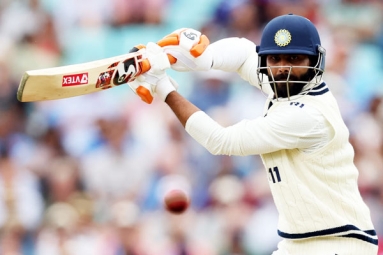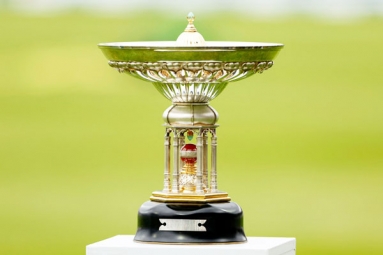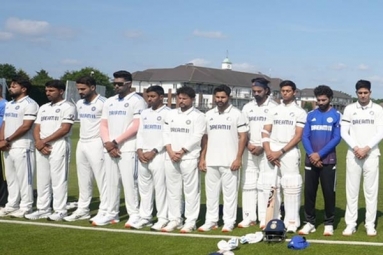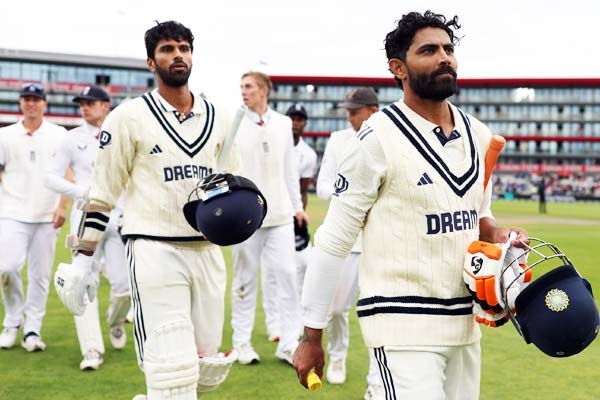
(Image source from: x.com/BCCI)
Even the most passionate supporters of England would have found it hard to explain what happened in the last minutes of the Manchester Test. It was an exciting and tough game that deserved to finish decently as a draw, even during the Bazball period. However, it was slightly tainted by unnecessary insults aimed at two Indian players who were close to scoring hundreds. First, to give some background for those in India who might have fallen asleep early, worried about a last-session collapse: your team achieved a brave draw. When Shubman Gill got out for exactly 100 just before lunch, Washington Sundar and Ravindra Jadeja partnered up to stop England from winning the series. Together, they scored 202 runs, batting for 45.2 overs without losing a wicket in the last two sessions. The pair showed patience, determination, and calmness while facing challenges from Jofra Archer, Chris Woakes, and, of course, Ben Stokes, who is England’s star player. They also handled left-arm spinner Liam Dawson, who tried to take advantage of the rough patch outside the left-hander's off-stump.
As the last hour began, Jadeja and Sundar had secured India’s position. With Jadeja scoring 89 and Sundar at 80—just 11 and 20 runs away from their centuries, respectively—the draw seemed inevitable. But there was still time left and milestones to reach. That's when England's captain Ben Stokes approached the umpires, saying he was willing to propose a draw and end the test an hour early. According to the rules of the game, if both teams agree that no result is possible in the last hour, they can declare a draw. India was only four wickets down and had built a 75-run lead. Stokes believed England had no chance of achieving a result. To be fair, Stokes had a reason to be cautious. He later mentioned that his decision was based on concern for his tired bowlers, especially with the final match of the series at The Oval just three days away. England had bowled 257.1 overs during the match. Stokes himself had a few troubles and had bowled a lot. Archer, on the other hand, seemed to be struggling during his last spell on Day 5.
“They played extremely well, and it became clear that there was only one possible outcome. I was not going to take the risk of injuring any of my main fast bowlers with one more game ahead. Dawsy had bowled so many overs in this match that his body started to tire and cramp up in his legs, so I didn't want to risk any of my key bowlers for that last half hour,” Stokes commented after the game. Stokes was fully justified in suggesting an early draw. However, what happened next left a negative impression. When Jadeja and Sundar refused the offer and showed they wanted to continue batting, Stokes appeared quite upset.
He expressed disbelief with a shake of his head before making a cutting comment to Jadeja: “Jaddu, do you want to score a Test hundred against Harry Brook and Joe Root?” That comment did not go over well — and justifiably so. Had Stokes forgotten that these two players had fought hard for each run, battling against England’s top bowlers for two sessions? They had truly earned their runs.
Another player from England, caught on the stump microphone, remarked: “If you wanted that hundred, you should have batted like that sooner.” Jadeja, to his credit, remained calm and didn’t react. Sunil Gavaskar, who was commentating at the moment, appeared upset. The Indian cricket legend criticized England’s actions, urging Jadeja and Sundar to bat through the last hour and make the opposing team work harder. His message was clear: if you can achieve milestones without going against the spirit of the game or risking the team's outcome, then why not go for them? Sanjay Manjrekar, another former Indian cricketer, was more straightforward in his criticism of Stokes. “It’s one thing to feel frustrated about the batters not leaving the pitch and that he has to use his overworked main bowlers. But acting grumpy in that way is just Stokes acting like a spoiled child,” Manjrekar commented on JioHotstar. “I can see why he would be surprised that India wanted to keep playing. ‘If you wanted to get a hundred, why didn’t you do it against the main bowlers?’ That was his complaint. But things won’t always go your way. He could have handled that situation better. “Ben Stokes, the hero and champion I admire, acted like a spoiled child at that moment.”
Meanwhile, Harry Brook threw the ball to bowl what were basically slow tosses at 60 kmph, making light of the situation. Jadeja happily hit them for boundaries, securing his hundred with a huge six off Brook. A couple of overs later, Washington Sundar achieved his first Test century — a moment of calm happiness and pride. It was only then that India agreed to shake hands. Stokes later stated he didn’t believe that an additional 10 or 15 runs would lessen the significance of what Sundar and Jadeja had done for their team. “I don’t think there would have been much more satisfaction from leaving the pitch at 100 not out, pulling your team out of a challenging spot, than if you left at 80 or 90 not out. That’s what you have accomplished for your team. Those extra 10 runs aren’t going to change the fact that you helped your team escape a very difficult situation and nearly saved them from losing the series before the final match,” he explained. Former England player Jonathan Trott also supported Stokes, suggesting that if the roles had been flipped, England would have left the field without chasing personal achievements. However, that misses the main point.
This was not about pursuing personal achievements while neglecting the team's goals. India had remaining overs, the draw was assured, and they were entirely entitled to continue playing. Making the England bowlers remain on the field for a longer period—especially with a quick turnaround before the next Test at the Oval—was a smart strategy.
India's head coach Gautam Gambhir stated clearly: “If one player is at 90 and another is at 85, shouldn't they both get a hundred? Would they have stepped off if one of the English players was at 90 or 85?” “If someone has a chance to score their first Test hundred, wouldn’t you let them? They faced challenges together. It's their choice. “If they wish to play in that manner, that’s up to them. I have no further comments. I believe both players earned those hundreds, and thankfully, they achieved it.”
Ultimately, Stokes was right to request the draw. However, his actions after India refused—pouting, making snide comments, and being dramatic—did not help his case. This is part of what makes Test cricket unique: resilience, integrity, and sometimes, modesty.



